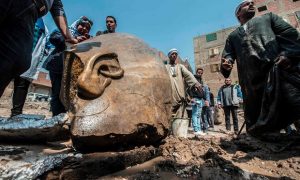A joint Egyptian-German expedition has recently unearthed several missing pieces of the statue of Ramses II, the Egyptian pharaoh who was the subject for another masterpiece, of which the Core students who have done their homework will remember at least a fragment–“Ozymandias,” by P.B. Shelley. The discovery is therefore literally out of this world, and, in literature, figuratively.
The pharaoh, also known as Ramses the Great or Ozymandias, was the third of the 19th dynasty of Egypt and ruled for 66 years, from 1279BC to 1213BC.
He led several military expeditions and expanded the Egyptian empire to stretch from Syria in the east to Nubia (northern Sudan) in the south. His successors called him the Great Ancestor.
Percy Bysshe Shelley’s 1818 sonnet Ozymandias which contained the line Look on my works, ye Mighty, and despair! was written soon after the British Museum acquired a large fragment of a statue of Ramses II from the 13th century BC.
A nice felicity would have been if at least one of the archaeologists was sufficiently well-versed to have recited those majestic lines upon discovery, but that would be a burlesque, more jest than majesty, so, on that note, some parodies: Necromancyneverpays, Brozymandias, Universitas
Read on his works at The Guardian

